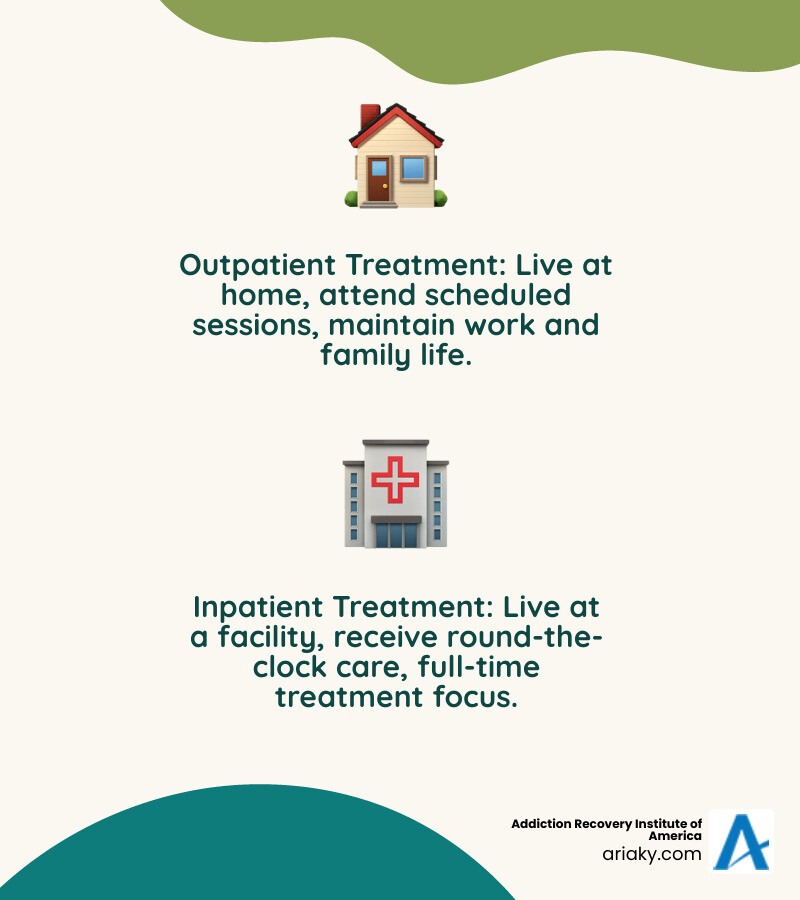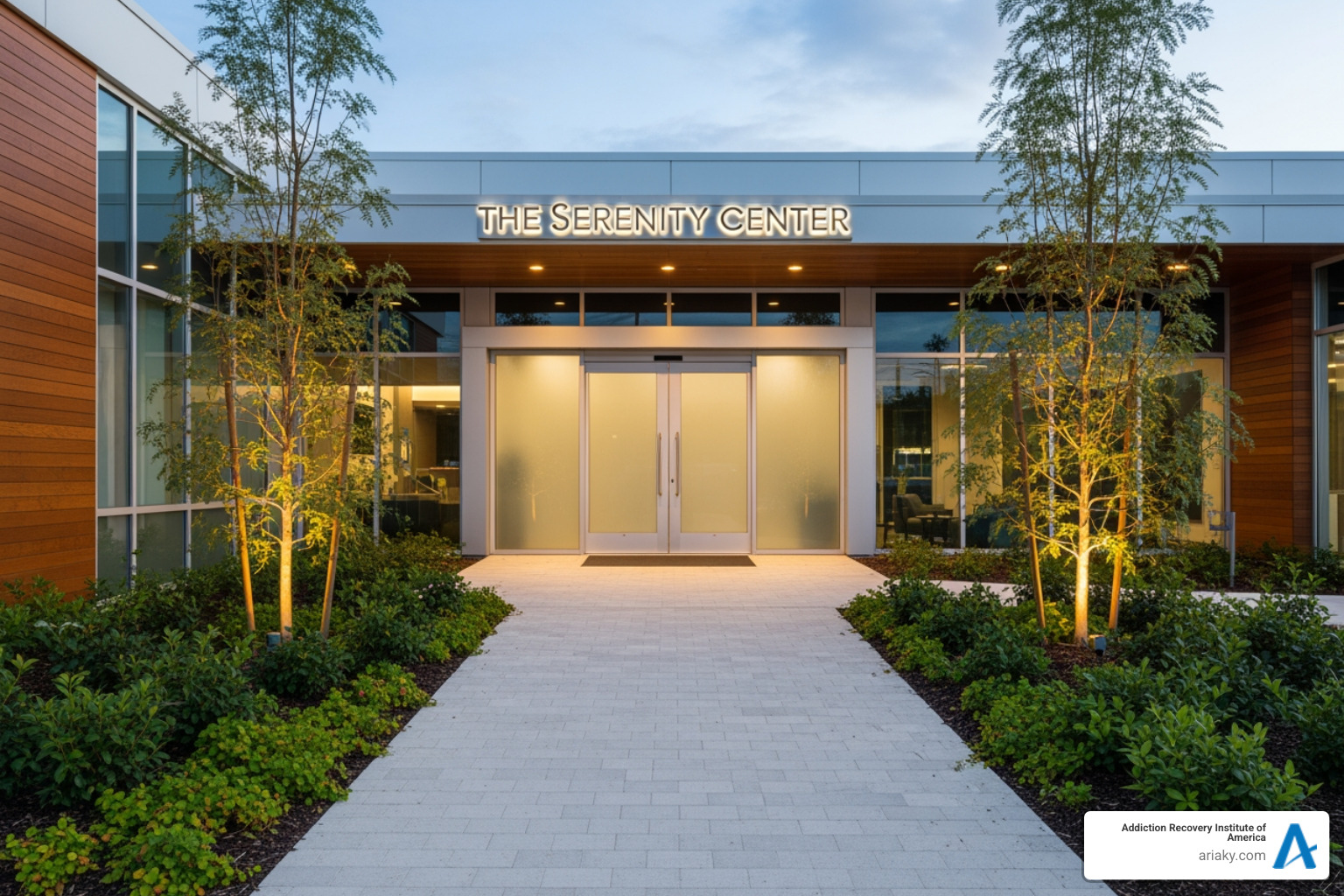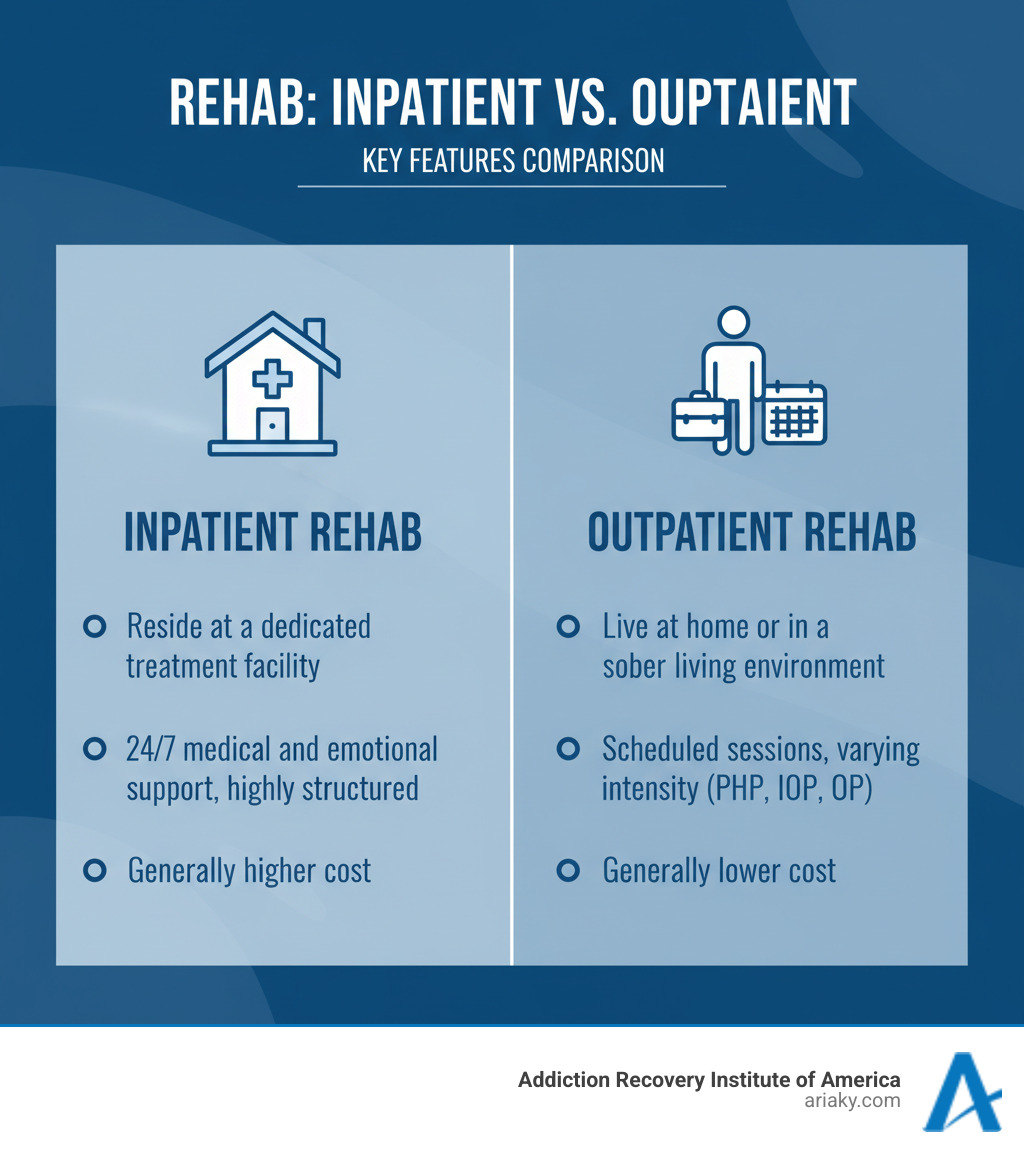Why Understanding Outpatient Addiction Treatment Matters
What is outpatient addiction treatment? It’s a form of substance use disorder care where you live at home and attend scheduled therapy sessions at a treatment center. Unlike inpatient programs, you don’t stay overnight, allowing you to maintain daily responsibilities like work, school, or family care while receiving professional support for recovery.
Quick Answer:
- Where you live: At home or in a sober living environment.
- When you attend: Scheduled sessions during the day, evening, or weekends.
- Time commitment: From under 9 hours per week (standard) to 20+ hours per week (intensive).
- Services: Individual and group therapy, family support, education, and medication-assisted treatment (MAT).
- Best for: Individuals with mild to moderate addiction, a stable home, and a need to balance treatment with daily life.
Seeking help for a substance use disorder is a life-changing step. Outpatient programs are a popular and effective option, serving as primary care for many individuals. They offer the same spectrum of services found in residential settings but with the flexibility to live at home. This is a practical path forward for parents, working professionals, students, or anyone who needs to integrate recovery into their existing life.
Research confirms that outpatient programs are as effective as inpatient treatment for most people. Studies show that 50-70% of participants report abstinence at follow-up, achieving outcomes comparable to residential programs at a significantly lower cost.

What is Outpatient Addiction Treatment and How Does It Work?

Outpatient addiction treatment is professional, structured care that fits into your life. You attend scheduled therapy and counseling sessions at a treatment center but return home each day. This non-residential approach allows you to practice recovery skills in your real-world environment—at home, work, or in your community—while maintaining your daily responsibilities.
When you face a trigger or a stressful moment, you can bring that experience to your next session and work through it with your treatment team. This flexibility is not just convenient; it’s an essential part of making recovery stick. To learn more about this approach, visit our page on Outpatient Drug Rehab.
Levels of Outpatient Care
Outpatient treatment is a spectrum of care designed to meet different needs. The level of support can adapt as you progress in your recovery.
Partial Hospitalization Programs (PHP): This is the most intensive level of outpatient care, also known as day treatment. It involves 20 or more hours of treatment per week, with sessions running five to six hours a day. PHP provides daily monitoring and multiple therapies, making it an excellent step-down from residential treatment or a starting point for those needing significant support with a stable home environment. Explore this option on our PHP Program Kentucky page.
Intensive Outpatient Programs (IOP): Offering a balance of substantial support and flexibility, IOPs typically require 9 to 20 hours of treatment per week. Sessions are often scheduled in three-hour blocks, three to five days a week, with morning and evening options to accommodate work or school. Research shows IOPs are as effective as inpatient care for most people, making them a popular and practical choice. Learn more at our Intensive Outpatient Program (IOP) Kentucky page.
Standard Outpatient Programs (OP): This is the most flexible level, with fewer than nine hours of treatment weekly, often just one or two sessions. Standard OP is ideal for individuals with milder substance use concerns or as a form of continuing care after completing a more intensive program. It helps maintain momentum and prevent relapse over the long term. Find details at our Outpatient Treatment Program KY page.
A Typical Week and Program Duration
Your weekly schedule depends on your level of care. A PHP schedule resembles a full-time job, with daily sessions from morning to early afternoon. An IOP schedule offers more free time, with sessions often held on evenings or weekends to fit around work.
Program duration varies based on individual needs and progress. While the average outpatient program lasts about ten weeks, many people benefit from three to six months of care or longer. The median completion time for IOPs is around 81 days. The timeline is driven by your progress in developing coping skills, building a support system, and maintaining sobriety. Recovery is a journey, not a race, and the program adapts to your pace.
Is Outpatient Rehab the Right Choice for You?
Choosing the right addiction treatment path is a critical decision. The main difference between outpatient and inpatient care is where you live during treatment and the intensity of the daily structure. Both aim for lasting sobriety but take different routes.
Here’s a quick comparison:

| Feature | Inpatient Rehab | Outpatient Rehab |
|---|---|---|
| Location | Reside at a dedicated treatment facility | Live at home or in a sober living environment |
| Intensity | 24/7 medical and emotional support, highly structured | Scheduled sessions, varying intensity (PHP, IOP, OP) |
| Cost | Generally higher due to lodging and round-the-clock care | Generally lower as you don’t reside at the facility |
| Ideal for | Severe addiction, unstable home, co-occurring disorders | Mild to moderate addiction, strong support, work/school commitments |
| Flexibility | Limited, full immersion in treatment | High, allows balancing treatment with daily responsibilities |
| Environment | Controlled, therapeutic bubble | Real-world, immediate application of skills |
Inpatient treatment provides a 24/7 controlled environment, removing you from daily triggers. Outpatient treatment integrates professional support with your daily life, allowing you to practice recovery skills in real time. For a deeper look, visit our Inpatient vs Outpatient comparison page.
Who is a Good Candidate for Outpatient Addiction Treatment?
Outpatient treatment is highly effective, but it works best when certain supports are in place. You may be an excellent candidate if you have:
- A mild to moderate substance use disorder without risk of severe withdrawal.
- A strong support system of family or friends who encourage your recovery.
- A stable and safe home environment free from substances and major triggers.
- High motivation and commitment to attend sessions and do the work.
- Work, school, or caregiving obligations that prevent you from attending a residential program.
- Recently completed inpatient treatment and need ongoing support as part of a Continuum of Care.
Can Outpatient Rehab Be Effective for Severe Addiction?
Yes, for many people. Research shows that intensive outpatient programs (IOPs) are just as effective as inpatient care for most individuals, including those with co-occurring mental health disorders like anxiety or depression.
However, outpatient may not be the best starting point if you face:
- A severe addiction with high risk of dangerous withdrawal symptoms (e.g., from alcohol or benzodiazepines), which require 24/7 medical supervision.
- An unstable or unsafe home environment filled with triggers or active substance use.
- Complex medical or psychiatric needs that require constant monitoring.
- A history of multiple relapses in less structured settings.
In these cases, inpatient care often provides the necessary safety and stability. Another option is combining outpatient treatment with a sober living home, which offers a structured, substance-free environment. The right level of care is determined by a comprehensive assessment using tools like the ASAM criteria. Our admissions team can help you determine the best path for your unique situation.
The Building Blocks of Recovery: Therapies and Services

Outpatient addiction treatment is more than a schedule; it’s a comprehensive, evidence-based program built around your specific needs. Recovery involves understanding the root causes of addiction and building new skills for a substance-free life. We use a holistic approach to create a personalized treatment plan with you.
What to Expect from the Assessment and Planning Process
Your journey begins with a thorough and compassionate assessment to understand your unique situation. This evaluation includes a review of your medical history, a mental health screening for co-occurring disorders, and an open discussion about your substance use history and patterns. We also consider social and environmental factors like your home life and support system. Based on this complete picture, we collaborate with you to set goals and create your personalized treatment plan.
Core Therapies Offered in Outpatient Treatment
Our programs use a range of evidence-based therapies to provide you with the tools for lasting sobriety.
- Individual Counseling: A confidential space to work one-on-one with a therapist, exploring the roots of addiction, processing trauma, and developing personal coping strategies.
- Group Therapy: A powerful setting to connect with peers who understand your experience. You’ll share, learn, and build a sense of community and hope.
- Family Therapy: Sessions designed to heal damaged relationships, improve communication, and educate loved ones about addiction, creating a supportive home environment.
- Cognitive Behavioral Therapy (CBT): A practical approach to help you identify and change negative thought patterns and behaviors that fuel substance use.
- Motivational Improvement Therapy (MET): Focuses on strengthening your internal motivation for change by exploring your personal reasons for seeking sobriety.
- Relapse Prevention Training: Essential training to help you anticipate high-risk situations, manage cravings, and create a plan to maintain sobriety long-term.
- Educational Workshops: Sessions that teach the science of addiction, stress management, emotional regulation, and other practical life skills.
The Role of Medication-Assisted Treatment (MAT) and Family
Medication-Assisted Treatment (MAT) can be a vital tool, especially for opioid or alcohol dependence. MAT combines FDA-approved medications with counseling to ease withdrawal symptoms and reduce cravings. This allows you to focus more effectively on the therapeutic work of recovery. Our medical team will determine if MAT is a suitable part of your treatment plan.
The role of family is crucial. Addiction impacts the entire family system, and involving them in the healing process through family therapy is key. We work to repair relationships, teach healthy communication, and build a strong support network at home, turning your family into informed allies on your recovery journey.
The Practical Side: Benefits, Challenges, and Costs

Understanding what is outpatient addiction treatment involves looking at how it fits into your daily life. This approach offers powerful advantages but also presents unique challenges that we help you steer.
Key Benefits of Choosing Outpatient Rehab
- Flexibility: Continue working, attending school, and caring for your family. Sessions are scheduled around your life.
- Affordability: Without costs for room and board, outpatient care is significantly less expensive than inpatient treatment, often allowing for a longer duration of care.
- Real-World Application: You immediately practice coping skills in your home and work environments, reinforcing what you learn in therapy.
- Privacy: Maintain your daily routine without a prolonged absence from work or life, offering a more discreet path to recovery.
- Strong Support Network: Stay connected to your family, friends, and community, who can actively participate in your healing process.
Potential Challenges and How to Overcome Them
Living at home during treatment requires navigating your normal environment, which can present challenges.
- Daily Triggers: You will face triggers at home and in your community. We help you identify these triggers and develop concrete relapse prevention plans to manage them.
- Need for Self-Discipline: You are responsible for your choices between sessions. This autonomy requires commitment, which we assess to ensure outpatient care is the right fit.
- Logistics: Consistent attendance is key. We can help you solve logistical barriers like transportation to ensure you don’t miss sessions.
- Building a Sober Network: It takes active effort to connect with sober peers. We guide you to resources like AA and NA meetings in Kentucky to build this vital support system.
Understanding the Cost of what is outpatient addiction treatment
Cost is a common concern, but treatment is more accessible than many realize. Outpatient care costs considerably less than residential programs because you are not paying for lodging and 24/7 supervision. This often allows for a longer treatment duration, which is linked to better long-term outcomes.
Your specific cost depends on the level of care (PHP, IOP, or OP), program length, and services included. Most insurance plans, including private insurance, Medicaid, and Medicare, cover outpatient addiction treatment. The Affordable Care Act mandates that substance use services be covered similarly to other medical care.
We encourage you to contact your insurance provider to understand your benefits. Our team can also verify your insurance and work to maximize your coverage. Don’t let financial concerns prevent you from seeking help. Reach out to us to discuss your options.
Frequently Asked Questions about Outpatient Rehab
We know you have questions about what is outpatient addiction treatment. Here are clear, honest answers to some of the most common ones.
How long does an outpatient rehab program typically last?
There is no one-size-fits-all answer. Program duration is custom to your individual needs and progress. However, a common benchmark is 90 days, as this timeframe allows for solid skill development. The full continuum of care can range from 3 to 6 months, and some individuals with more complex needs may benefit from treatment lasting a year or more. Your progress in meeting recovery milestones determines the length of your program, not a set calendar date.
What is the difference between intensive outpatient programs (IOPs) and standard outpatient programs?
The main difference is the time commitment and level of structure.
- Intensive Outpatient Programs (IOPs) are more structured, requiring 9 to 20 hours of treatment per week. They are ideal for those who need substantial support while living at home and often serve as a step-down from residential care.
- Standard Outpatient Programs (OPs) are more flexible, involving fewer than 9 hours of treatment per week. They are best for individuals with milder substance use disorders or as a form of long-term continuing care (aftercare) to maintain sobriety.
How does outpatient rehab help with relapse prevention?
Relapse prevention is a core component of outpatient treatment, integrated into every aspect of the program. We help you succeed long-term by:
- Identifying Personal Triggers: Learning to recognize the people, places, and feelings that lead to cravings.
- Developing Coping Skills: Using therapies like CBT to build healthy strategies for managing stress and difficult emotions without substances.
- Building a Sober Support Network: Connecting you with peers in group therapy and mutual-help groups like AA and NA for ongoing support.
- Creating an Aftercare Plan: Developing a personalized roadmap for your continued recovery after you complete the program.
- Practicing in the Real World: Applying these skills immediately in your daily life, which makes them more effective and sustainable.
Begin Your Journey with Flexible, Effective Care
Recovery is possible, and it begins with taking the first step. You now know that what is outpatient addiction treatment is a flexible, effective path to sobriety that fits into your life. The only question left is if you are ready to begin.
At Addiction Recovery Institute of America (ARIA Kentucky), we believe in finding a program that fits you. As an accredited, AODE-certified addiction rehab center, we are dedicated to providing compassionate, expert care to help you achieve lasting recovery.
We offer a full continuum of care to meet you where you are, including our Partial Hospitalization Program (PHP), Intensive Outpatient Program (IOP), and standard outpatient services. We also provide detox and residential programs for those who need a higher level of initial care.
Our outpatient programs are designed to integrate into your schedule, with morning, evening, and weekend options. You don’t have to choose between getting help and living your life. We serve communities across Kentucky, including Ashland, Bowling Green, Covington, Florence, Lexington, Louisville, Morehead, Newport, Owensboro, and Paducah.
You deserve a life free from substance use. Our team is here to partner with you to find hope, rebuild relationships, and reclaim your future. Reach out to us today to discuss how we can support you.
Find the right outpatient treatment program in KY for you.
Your recovery journey begins now. We’re honored to be part of it.

